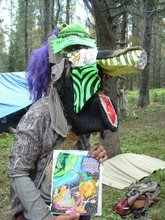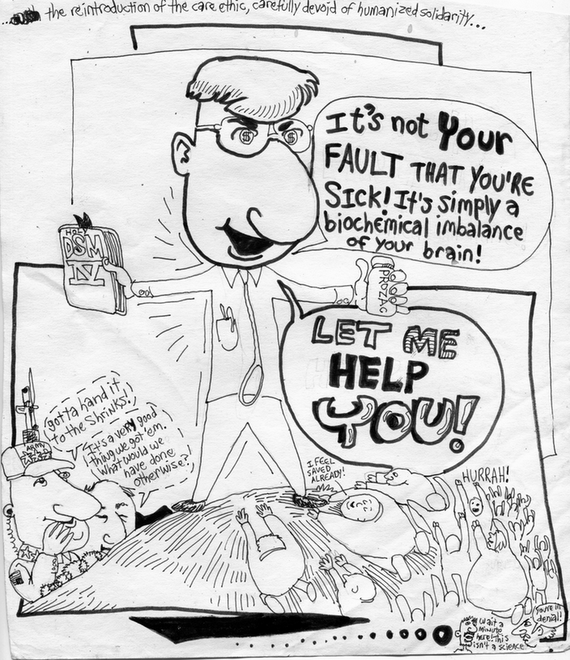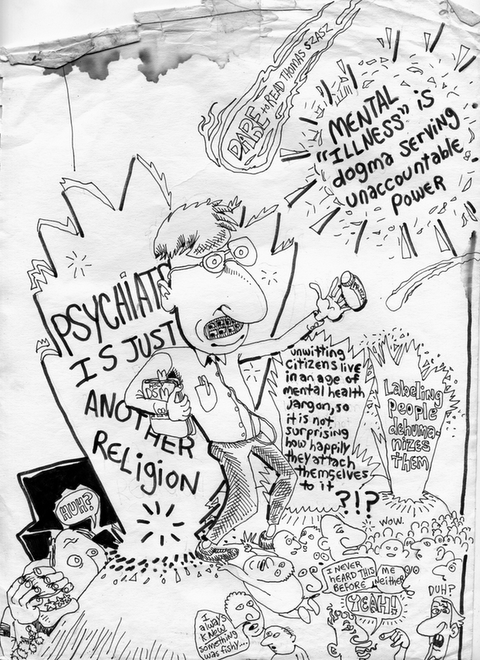Decades, if not centuries, have been spent attacking racism (i.e. from slave revolts to abolitionists and up to now). Yet the root (or heart) of the matter of *authoritarian hyping against difference* --exploiting our fears in the same manner that racists do-- remains fully intact! And we see this proof every time national or local media come out: hyping the national or local prejudice and frustrated fears against others who are not allowed CONTEXT to their actions--across the board.
But those on the Left (and Right, etc.) wings of colonization don't point this out. Why is that? Because they're playing games too, in order to maintain the larger picture of colonization. They're utilizing hype to manipulate their target audiences towards actions that they believe "Are The Way To Go"--despite centuries, now, of continuing this with the same old superficiality still completely intact! And, each time this same old crap--fear and hatred of indigenous folks, Chinese, Irish, Italians, Germans, Blacks, women, etc. etc. etc.--has reared it's ugly head, various persons representing colonization have come in and said that "we will help you" if you "just follow us."
I got to responding to a Leftist thinker (named Chris D.) over on the infoshop.org site awhile ago who sounds pretty articulate and had the courage (?) or naivity (?) to bring his internalized (?) value system into anti-authoritarian territory. What follows is an excerpt which takes on his orientation to racism as central to "the revolution". We're talking about leaders and the necessity, in his mind, to categorically "respect" black reform-oriented "leaders" because of their experience and status as Black. Why cannot we respect people based on the actual *merit* of what they say?? (What a curious manipulation we're apparently getting stuck in with this thing called "respect"):
Chris: The abject failure of so many movements in U.S. history to overcome the obstacles of whiteness suggest that this is a question worthy of special attention.
oingO: We need to look *behind* this "failure" and see it for what it is: the routine method of elites courting "leaders" to "join with them"; cooptation. Alienated from their "followers" as leaders usually are, it's quite easy to "convince" them into a continuing heightening of cooptation.
What do you think Colin Powell (or Condoleeza Rice) is doing? They're "Black" but they learned, like every other minority (including whites) to *subordinate the depth of their own experience* to the allowances of the profession. Whites have to do this too. Whites have to *subordinate their individualities* and individual experience (and intuition) to the Given value system, or they don't move "up".
Like Noam Chomsky shows, persons have to *internalize* the Given *values*, period, or they don't move up in their careers (in the media or wherever).
And the New York Times, today, discusses this a bit on the topic of secretary of state (?) Rumsfeld just picking a new military chief in the psy ops community--viewed as a non-mainstream part of the "service". The generals are "seething", but they know they'd better find a way to fall in line, or they won't move up.
Whiteness helps, yes. But it ain't foolproof if they don't know how to, or don't want to play the game. Look at every "independent" that runs for president (for a quick reference); recall how the Green Party candidates are kept out of the debates, and how Ross Perot (the *billionaire*) had his character quite fully assasinated. The color of his skin may've gotten him as far as he did, but when *it truly counted*? Nope.
So it, by itself, is not the only thing to look at, and I see the Left wing of colonization simplifying this as a way to apparently *deflect* the reality that the depth of the problem is much broader than simply 'race'. Racism is a symptom, and so is sexism, and class, and hatred of "radicals" and so-called "traitors" (like Philip Agee), and so on.
The onus of the problem, I think is either something along the lines of *strategy* where there is *NO* racial solidarity amongst whites except as a tool.
There is no real solidarity amongst peoples who are well-colonized and subordinated to the whims of the social engineers.
The origins of this? Fear is the one I've come up with. Alienation leading to FEAR, and for a society that has been at constant war for the last thousand or so years (in so-called "peacetime" or not) that FEAR has become institutionalized.
To overcome this FEAR, we're not going to do it by only continuing our trenches and racial lines. That is one way, but at the same time we're going to have to follow our intuitions to reach out and build bridges of understanding.
Charles H. King, an Atlanta, GA Black lawyer (author of _Fire In My Bones_) used to hold discussions on something that made a lot of sense to me. He had a way of doing things where he'd point out and we'd realize how MOST OF US are afraid of peoples who are different from us, and that we act in racist ways all the time, or at least when our loved ones are concerned.
I attended one of his forums back in the 1980s, which was being attended by mid-level management types and persons who a local Black newspaper thought ought to attend (I got a "scholarship" to go, myself). Here's the story he gave, and I thought it was quite reasonable to see what he was saying:
"You're with your loved ones in a car in a winter blizzard in unfamiliar territory and your car breaks down. You leave to go find help at some homes you saw a ways back. You come to two homes equidistant away and one, you see, has a black family and the other has a white family. Which one do you go to first?"
Generally, you can see his point, depending on your race. If you're white and you happened to grow up surrounded by blacks, you'd mess with that generalization, but you can see what i'm getting at. And it's true if we replace it with ladies or gays or whichever group we can think of.
The point he made was NOT to demonize people for holding ignorant fears and beliefs, because you want to keep a bridge with people, and try to evolve their thinking. So, not to villify being racist (aka being imperfect), but to take responsibility for our fears and ignorance, and act constructively in the future.
But see the colonizer mentality (Left, Right, and often beyond) doesn't allow us to have any grey area approach whatsoever. Their rigid belief/ideology is playing a game, a meta game; a game of hype, of reinforcing our divisions, while calling for cosmetic sleight of hand. And so our imperfections are *reduced down* to expediency and what passes for political "pragmatism".
Curious ideas, eh?



